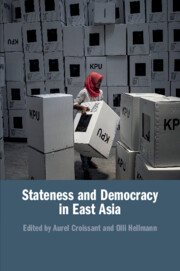Book contents
- Stateness and Democracy in East Asia
- Stateness and Democracy in East Asia
- Copyright page
- Contents
- Figures
- Tables
- Contributors
- Acknowledgements
- 1 Introduction: Rethinking Stateness and Democracy in East Asia
- 2 State-Building and Democratization
- 3 South Korea’s Democracy and the Legacies of the Developmental State
- 4 After Hegemony: State Capacity, the Quality of Democracy and the Legacies of the Party-State in Democratic Taiwan
- 5 Democratization Interrupted: The Parallel State and the Demise of Democracy in Thailand
- 6 Weak State and the Limits of Democratization in Cambodia, 1993–2017
- 7 The Institutional Roots of Defective Democracy in the Philippines
- 8 Stateness and State Capacity in Post-Authoritarian Indonesia: Securing Democracy’s Survival, Entrenching Its Low Quality
- 9 As Good as It Gets? Stateness and Democracy in East Timor
- 10 Stateness and Democracy: Evidence from East Asia and Cross-Regional Comparisons
- Index
- References
3 - South Korea’s Democracy and the Legacies of the Developmental State
Published online by Cambridge University Press: 13 May 2020
- Stateness and Democracy in East Asia
- Stateness and Democracy in East Asia
- Copyright page
- Contents
- Figures
- Tables
- Contributors
- Acknowledgements
- 1 Introduction: Rethinking Stateness and Democracy in East Asia
- 2 State-Building and Democratization
- 3 South Korea’s Democracy and the Legacies of the Developmental State
- 4 After Hegemony: State Capacity, the Quality of Democracy and the Legacies of the Party-State in Democratic Taiwan
- 5 Democratization Interrupted: The Parallel State and the Demise of Democracy in Thailand
- 6 Weak State and the Limits of Democratization in Cambodia, 1993–2017
- 7 The Institutional Roots of Defective Democracy in the Philippines
- 8 Stateness and State Capacity in Post-Authoritarian Indonesia: Securing Democracy’s Survival, Entrenching Its Low Quality
- 9 As Good as It Gets? Stateness and Democracy in East Timor
- 10 Stateness and Democracy: Evidence from East Asia and Cross-Regional Comparisons
- Index
- References
Summary
South Korea is a success story in terms of institutional development. Not only did the country build a high-capacity ‘developmental state’ in the early second half of the 20th century but, towards the end of the 20th century, Koreans also witnessed the replacement of autocratic rule by a liberal democratic regime. The sequencing of these development stages seems to support ‘stateness first’ arguments, which claim that succesful democratization requires certain degrees of infrastructural capacity and citizen agreement. And, in fact, the ‘developmental state’ significantly facilitated the survival and rooting of South Korea’s democracy. However, as this chapter show, the process of state-building under autocratic rule left behind institutional legacies that continue to hinder democratic consolidation – in particular an under-institutionalized party system and a weak civil society. More generally, the chapter shows that the state-democracy nexus can be subject to path-dependent effects.
Keywords
- Type
- Chapter
- Information
- Stateness and Democracy in East Asia , pp. 47 - 70Publisher: Cambridge University PressPrint publication year: 2020
References
- 3
- Cited by



